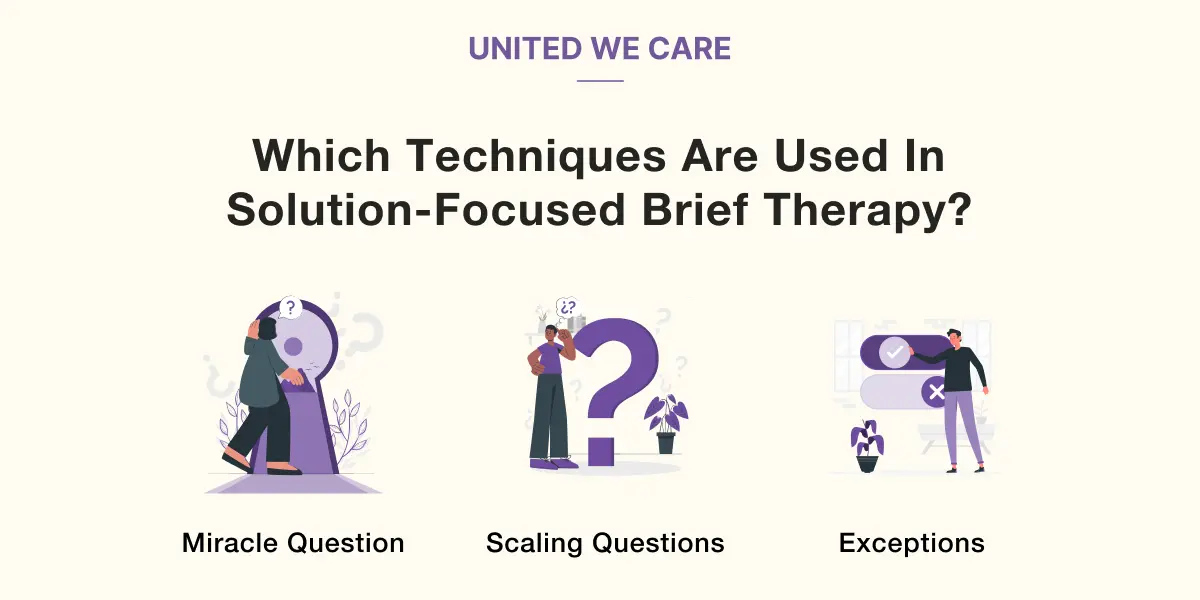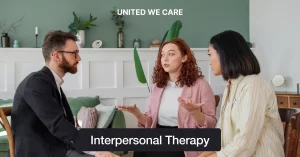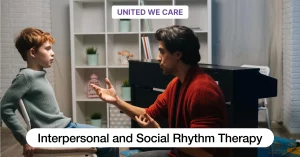Introduction
It is a common misconception that psychotherapy is a lengthy process and only for those experiencing complex mental health issues. While there is some truth to this, therapy is equally beneficial for people with current, specific life challenges who are seeking a brief and immediate intervention. These are known as short-term goal-focused therapies. One effective option under this kind of therapy is Solution-Focused Brief Therapy (SFBT).
SFBT can be especially helpful for those who are generally well functioning, don’t have any underlying mental illnesses, and are just looking for assistance with particular life issues. In this blog, we’ll discuss what SFBT is, the techniques used, its benefits, and its effectiveness.
What is Solution-Focused Brief Therapy?
Solution-focused brief therapy is a kind of short-term, goal-oriented therapy aimed at helping people construct solutions to their challenges instead of uncovering their root causes or gaining deep insight into them.
Steve de Shazer, along with Insoo Kim Berg, co-founded the SFBT approach in the 1980s. The idea behind SFBT is to shift the attention from what created an issue to a desired vision for the future through finding solutions in the present.[1] The “brief” in SFBT signifies an approach to minimize the time spent in therapy by focusing on and finding a solution immediately.
Principles of Solution-Focused Brief Therapy
SFBT is based on the following principles and assumptions:
- Change is constant and inevitable.
- The focus is on solutions, i.e., what’s changeable and possible.
- The focus is on future visions, not past experiences.
- The client must have the willingness to make changes.
- The client possesses the strengths and resources to solve their problems, and the therapist helps bring them out and utilize them.
- The goals should be specific, measurable, achievable, and realistic.
- The therapist and client work as partners to create meaningful solutions
- Therapy is conducted over a short time frame, an average of five sessions.
- The termination of sessions is discussed at the beginning of the therapy process itself to foster a sense of independence in the client and be focused on achieving goals.
Techniques Used in Solution-Focused Brief Therapy
The techniques used in SFBT are aimed at promoting problem-solving and enhancing the client’s own ability to work through challenges. Common techniques used in SFBT are: [2]

Miracle question
In this technique, the therapist asks the client to imagine their desired future where they are not affected by their current challenges. This helps the client see a path forward and identify actionable steps they can take to make this a reality.
Typically, the miracle question goes like this: “Suppose that while you were sleeping tonight, a miracle happened. The miracle is that the problem which brought you here is solved. However, because you’re sleeping, you don’t know that the miracle has happened. So, when you wake up tomorrow morning, what will be different? What will tell you a miracle has happened and the problem that brought you here is solved? [3]
The client then answers what kind of changes they can imagine in terms of their feelings, behavior, or routine while the therapist asks them to elaborate on them further. These responses are then used to create actionable steps in the present that can align with these envisioned changes.
Scaling questions
Scaling questions are used to quantify qualitative aspects such as feelings, confidence level, work stress or satisfaction, etc. They help in understanding where the client currently stands with regard to their desired goals.
The client is asked to rate their experiences on a scale of 0 (lowest) to 10 (highest). For instance, the client may be asked, “How much would your life change or improve if the miracle occurred?” or “How confident do you feel about finding a solution for the challenge?”.
The exploration of why the client gave a particular rating can help get an insight into what it would take to improve a situation, as well as the client’s motivation for finding a solution. The therapist also acknowledges and gives positive reinforcement for progress made.
Exceptions
This technique is based on the assumption that no problem is constant, and there are times when the problem is absent or a little better. Finding exceptions when the problem is not there or is less severe can help identify what is happening differently during those times, how the client is coping during those times without even realizing it, and shifting the focus from the problem to the client’s strength and solution.
By building on these exceptions, the therapist and client both work together to develop successful strategies that can be applied to other situations as well.
Effectiveness Of Solution-Focused Brief Therapy
A 2021 study conducted a meta-analysis of 20 studies from 1991 to 2019 on solution-focused brief therapy to gauge its effectiveness on children and adolescents. The study found SFBT to be effective in addressing behavior problems in children and adolescents, particularly for externalizing behaviors. [4]
Why Do You Need Solution-Focused Brief Therapy?
SFBT can be used effectively for all age groups- from children to older adults. It is a time-efficient technique that focuses on your already existing strengths and resources to deal with challenges. Collaboratively with your therapist, you can craft practical solutions based on solid goal setting and real-life actionable steps.
Conclusion
SFBT is a short-term, goal-focused psychotherapy technique that can be especially helpful if you are looking for a quick resolution to a current life problem. If you are looking for a solution for the future as opposed to insight into the past, SFBT is the way to go. Book a session with one of our mental health experts at United We Care, who can recommend a therapy best suited for your needs.
References
[1] C. Iveson, “Solution-focused brief therapy,” Advances in Psychiatric Treatment, vol. 8, no. 2, pp. 149–156, 2002. [Online]. Available: https://www.cambridge.org/core/journals/advances-in-psychiatric-treatment/article/solutionfocused-brief-therapy/B8198B18DDEE77F9D39A09FDBCC0CE15. Accessed: Dec. 29, 2023. doi: 10.1192/apt.8.2.149
[2] Steve de Shazer, Yvonne Dolan, Harry Korman, Terry Trepper, Eric McCollum, Insoo Kim Berg, More Than Miracles- The State of the Art of Solution-Focused Brief Therapy. [Online]. Available: https://www.taylorfrancis.com/books/mono/10.4324/9781003125600/miracles-steve-de-shazer-yvonne-dolan-terry-trepper-insoo-kim-berg-harry-korman-eric-mccollum. Accessed: Dec. 29, 2023.
[3] Teri Pichot, Sara A. Smock, Solution-focused Substance Abuse Treatment. [Online]. Available: https://books.google.co.in/books/about/Solution_focused_Substance_Abuse_Treatme.html?id=SB8zmcQEwusC. Accessed: Dec. 29, 2023.
[4] K.-S. Hsu, R. Eads, M. Y. Lee, and Z. Wen, “Solution-focused brief therapy for behavior problems in children and adolescents: A meta-analysis of treatment effectiveness and family involvement,” Children and Youth Services Review, vol. 120, 105620, 2021. [Online]. Available: https://doi.org/10.1016/j.childyouth.2020.105620. Accessed: Dec. 29, 2023.









